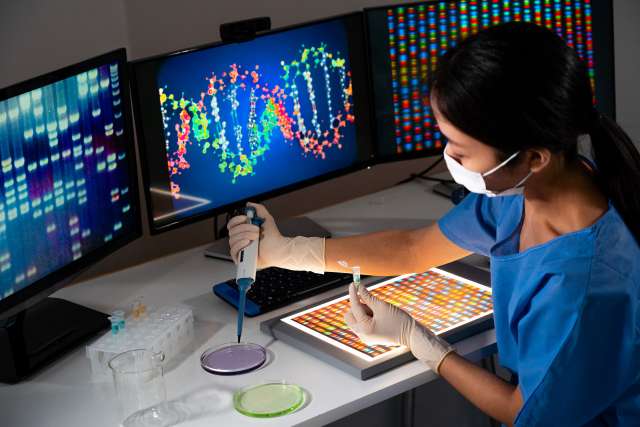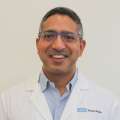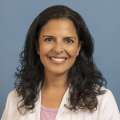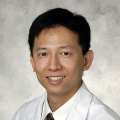Immunology
As leaders in immunology, UCLA Health experts treat babies, children and adults. Using revolutionary technology and unmatched expertise, we specialize in delivering customized care to people with all types of immunodeficiencies.
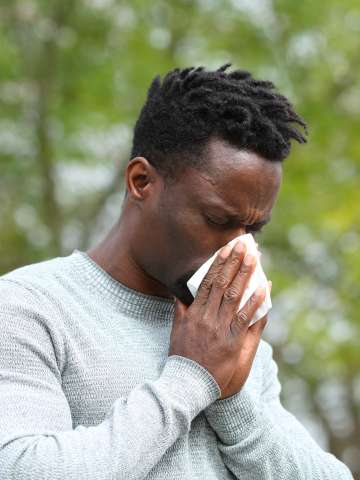
UCLA Health excellence in immunology
At UCLA Health, our immunologists are at the forefront of personalized care for people with immune deficiency disorders. Highlights of our program include:
Dedicated team of experts: As an academic medical center, UCLA Health is uniquely qualified to make a difference in the lives of the patients we treat. We bring together the curiosity, innovation and passion of an entire team of experts. This collaboration allows us to properly diagnose immune deficiencies and create tailored treatments for even the most complex immune disorders. When you come to us, you have a network of immunologists and researchers devoted to your care.
Extensive experience: Our immunology program is one of the most long-standing and successful in the United States. As leaders in immunology since the late 1960s, UCLA Health specialists were among the first to perform a lifesaving bone marrow transplant to cure severe combined immunodeficiency (SCID). Our commitment to helping people with these disorders has never wavered.
Care for children and adults: We recognize that immune deficiencies have clinical consequences at any age. At UCLA Health, we care for everyone from newborns to the elderly. We do not “hand off” care to other doctors or other hospitals as children age into adulthood.
Customized treatments: What sets our group apart is our dedication to treating each patient with the most customized therapies available anywhere in the world. You receive a tailored plan that we adjust based on how your body is responding to treatments. We can study the immune system’s response to treatment using specialized and unique research tools. This effective, individualized approach reflects our dedication to improving the lives of our patients, one step at a time.
Expertise in rare immune disorders: Many of our patients have lived with immune disorders for years without a proper diagnosis. They come to us when they can’t find answers elsewhere. Our team specializes in undiagnosed immune diseases. We have been working with the NIH-funded Undiagnosed Diseases Network at UCLA Health since its founding. Moving forward, we work in partnership with the California Center for Rare Diseases here at UCLA Health. We offer answers, support and hope for people with ultrarare disorders.
Groundbreaking cures: UCLA Health is one of the only institutions in the world to create and offer gene therapy for immune disorders. Using state-of-the-art technology, we identify the gene that’s causing the immune disorder and insert a normal copy of that gene into a patient’s stem cells. The modified stem cells go on to produce immune cells that have the normal gene. In many people, gene therapy successfully cures the immune disorder. With decades of experience using these therapies, we're at the forefront of treatments and cures for genetic immune diseases.
Our areas of care
At UCLA Health, we offer the most advanced diagnostics available today. People come to us from all over the world for specialized care and tailored treatments from our immunologists. Our services include:
Expert care for children and adults
Many immune disorders appear in childhood. But some people don’t develop symptoms until later in life. Before coming to us, it’s common for our adult patients to have seen multiple doctors over many years without receiving an accurate diagnosis.
At UCLA Health, we deliver exceptional care for people of all ages, from newborns, children and teenagers to older adults. Our team includes doctors who specialize in both pediatrics and adult medicine. Using our deep knowledge of immune disorders, we offer patients answers and hope through promising treatments.
Severe combined immune deficiency (SCID) screenings
We serve as one of the main SCID screening centers in the state of California. We screen newborns from across the state for this collection life-threatening genetic immune deficiency disorders.
We help babies with SCID from the first few days of their life. As they grow up, we provide continuous care — from diagnosis to cure. Our team participates in national and international efforts to improve the care of newborns with SCID, and we have access to the latest emerging and approved therapies.
Precise diagnosis
Our experts use the latest technology and their years of experience to diagnose even the most uncommon immunodeficiency disorders. We specialize in identifying the exact genetic variants causing the disorder so we can create customized, effective therapies.
Based on your health and family medical history, we use a range of laboratory tests to deliver a precise diagnosis. These include blood tests and sophisticated genetic testing techniques to identify specific abnormalities.
Customized treatments
At UCLA Health, we develop therapies designed specifically for you or your child. Our specialists monitor your health through blood tests and other exams to evaluate how you respond to treatments. Then we adjust the medications based on our findings.
Support and resources
Our immunology team is committed to offering support and guidance through this journey with you and your family. We provide a wide range of services to help you maximize your health and well-being. Through educational webinars, Q&A sessions and support groups, UCLA Health specialists deliver comprehensive guidance and helpful resources.
As a team, we volunteer dozens of hours to support many advocacy groups. We deliver talks and presentations to the Immune Deficiency Foundation, the Immunoglobulin National Society and several other organizations.
Immunodeficiency conditions we treat
Immunodeficiency disorders cause problems with how the immune system works. These disorders make you more vulnerable to infection because your body can’t fight bacteria and viruses that make you sick. Immune disorders can also increase your risk of cancer. People with immunodeficiencies have infections that:
- Are severe and require extensive treatment
- Come back after treatment
- Don’t go away, or take a long time to go away
- Result from germs or viruses that don’t usually cause serious infections in people with healthy immune systems
As leaders in immunology, UCLA Health specialists are highly qualified to treat even the most complex immune disorders. Our expertise includes helping babies, children and adults with:
Immune dysregulation
Beyond infections, many of our patients suffer from dysregulation of the immune system. This happens when the body cannot control a response from its immune system. Signs of immune dysregulation include severe:
- Autoimmune disease, which happens when the immune system attacks healthy parts of the body
- Inflammation (swelling), fevers and pain all over the body
- Allergies and abnormal allergic reactions
Primary immunodeficiency disorders
There are more than 450 primary immunodeficiencies (PI), also called inborn errors of immunity, or IEIs. PIs are present at birth. They result from a genetic abnormality. Some of these are inherited (passed down through families). Other genetic disorders arise spontaneously (are not inherited).
UCLA Health immunologists have experience treating all forms of PIs and those that occur along with other complex health conditions, such as autoimmune disorders. We specialize in treating:
- Autoinflammatory diseases, including familial Mediterranean fever, inflammosomopathies and interferonopathies
- Bone marrow failure syndromes
- Combined immunodeficiency (CID) and severe combined immunodeficiency (SCID)
- Complement deficiencies
- DiGeorge syndrome (22q deletion syndrome)
- Familial hemophagocytic lymphohistiocytosis (HLH)
- Genetic autoimmune diseases
- Hyper-IgE syndromes (HIES)
- Immune dysregulation with lymphoproliferation, including autoimmune lymphoproliferative syndromes (ALPS)
- Immune dysregulation with colitis, including very-early onset inflammatory bowel diseases
- Neutrophil defects (including CGD) and congenital neutropenias
- Mendelian susceptibility to mycobacterial infections
- Predisposition to severe viral infections (including COVID-19) and invasive fungal infections
- Primary antibody deficiencies, including common variable immunodeficiency (CVID)
- Susceptibility to herpes simplex encephalitis, Epstein-Barr virus (EBV) infection and lymphoproliferation
Secondary immunodeficiency disorders
Secondary immunodeficiency disorders aren’t present at birth. These immune disorders can result from many different diseases, treatments or environmental factors that affect the immune system.
Chemotherapy drugs, medications for rheumatoid arthritis and prolonged use of corticosteroids can cause secondary immunodeficiencies. CAR T cell therapy for lymphomas can result in permanent secondary antibody deficiencies. These disorders have similar symptoms and cause some of the same medical problems as primary immunodeficiencies. Many of these patients need to see an immunologist in addition to their oncologists and rheumatologists.
Immunodeficiency treatments we offer
UCLA Health immunologists lead the nation in innovative, effective treatments for all types of immune disorders. Our knowledgeable, compassionate team understands that each disorder is unique. We tailor your care and treatment plan based on the specific gene mutation, your medical history and your symptoms. We deliver the full range of treatments, including:
Personalized medications
We offer medications that aren’t available elsewhere. Our experts develop an approach based on the exact genetic disorder, your overall health and other medical concerns.
We may recommend drugs that modulate (adjust) the immune system. These medications enhance your body’s immune response so your immune system can better protect you from germs and abnormal cells, including cancer cells. Or, we may recommend medications that suppress (weaken) your immune response so your immune system doesn’t mistakenly attack healthy cells.
Immunoglobulin therapy
This therapy can prevent infections in people with certain immune deficiency disorders. You receive intravenous immunoglobulin (IVIG) treatments through a vein. Or, your doctor injects them just under the skin, which is called subcutaneous immunoglobulin (SCIG). Most people with immunodeficiencies need these treatments regularly for the rest of their lives.
At UCLA Health, we go beyond immunoglobulin replacement therapies. Our team has developed the ability to use off-label therapies to help people with immune dysregulation. We have a strong track record of working with companies to use unapproved therapies to manage ultrarare disorders. These customized treatments are necessary for managing rare diseases for which no standard therapies exist.
Hematopoietic stem cell transplant (HSCT)
For specific types of severe immune deficiencies, stem cell transplantation (bone marrow transplant) is the best treatment option. UCLA Health experts specialize in this lifesaving treatment. We work with colleagues to replace the deficient or dysfunctional immune system with a healthy new one.
We remove cells called hematopoietic stem cells from the bone marrow of a healthy donor. Bone marrow is the soft, spongy tissue inside the bones that develops blood cells. We then transplant the stem cells into the recipient’s bone marrow. The transplanted stem cells make healthy immune system cells.
The goal of transplantation is to provide a complete immune system. In most cases, the patient no longer has significant problems fighting infections. We do these procedures in coordination with our expert transplant team. Learn more about UCLA Health transplant services.
Gene therapy for immune deficiency
UCLA Health experts identify the gene that is causing an immune disorder. Using sophisticated technology, we insert a healthy copy of the gene into a patient’s stem cells. This allows the stem cells to produce blood cells that contain the normal gene. These revolutionary treatments successfully treat many types of immune deficiencies.
Meet our team
Our specialists are board-certified experts in immunology. Always at the forefront of the latest advances in immunodeficiency care, our immunologists draw on years of experience and unmatched expertise to treat people of all ages.
Our Physicians
Contact us
UCLA Health immunologists deliver customized treatments for all types of immune disorders. Call to connect with an expert.
Find your care
UCLA Health immunology specialists deliver customized treatments for all types of immune disorders. Call to connect with an expert.
